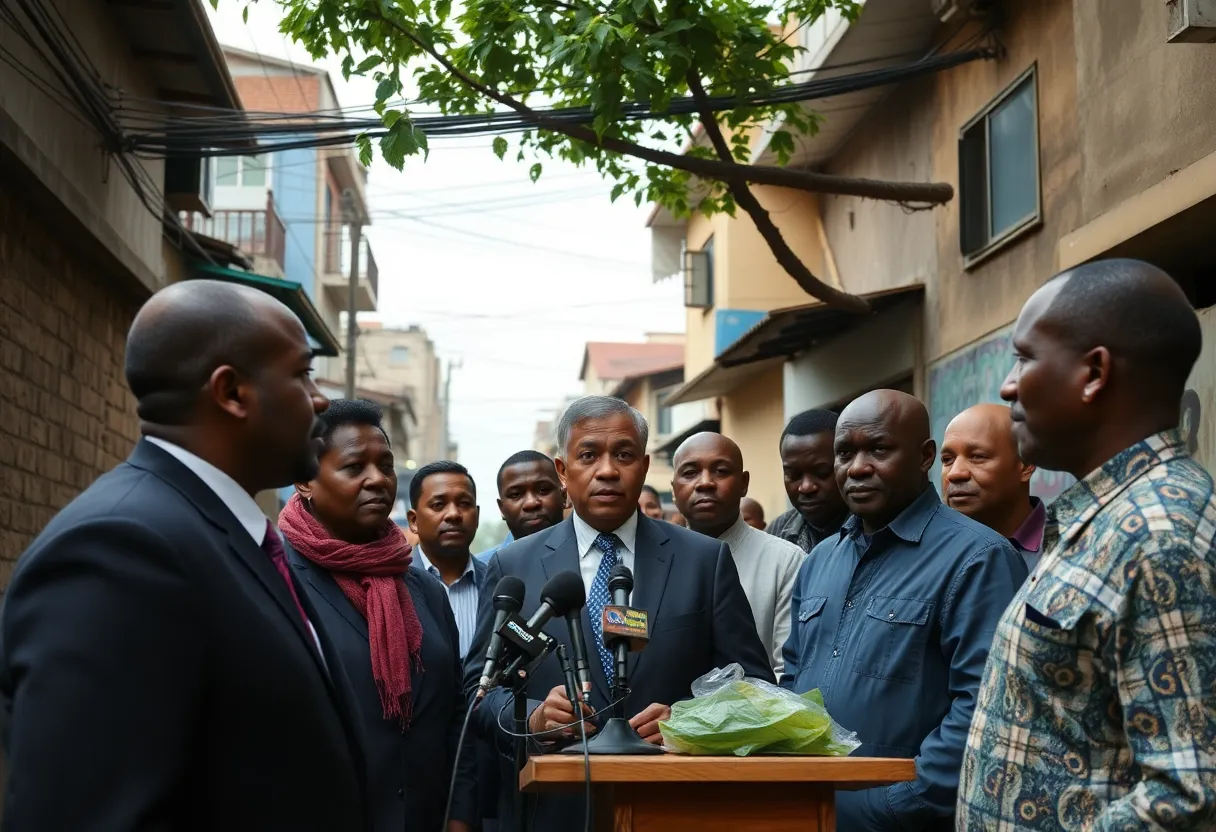Boston, October 26, 2025
News Summary
Governor Maura Healey of Massachusetts condemned the federal decision to terminate SNAP benefits amidst the ongoing government shutdown. This move will impact over 1 million residents who rely on this program for food assistance, particularly affecting vulnerable populations such as children and seniors. The governor, along with state officials and local advocates, emphasized the immediate consequences on food access, local businesses, and state budgets, and urged potential solutions to support affected families.
Boston — Governor Maura Healey criticized the federal decision to end Supplemental Nutrition Assistance Program (SNAP) benefits for many residents of Massachusetts as the ongoing federal government shutdown continues, and officials warned that the move will immediately affect food access, local businesses and state budgets.
What happened
Governor Maura Healey held a press conference in Boston’s Roxbury neighborhood on Friday morning to address the ending of SNAP benefits due to the ongoing federal government shutdown. She said the federal action will stop SNAP benefits starting next week and will leave many households without food assistance.
Scale and populations affected
Over 1 million Massachusetts residents will be unable to purchase food for themselves and their families due to the cessation of these benefits. Nearly 2 million people in Massachusetts rely on SNAP benefits, making up over 15% of the state’s population. The demographic breakdown provided by state officials showed that 32% of those utilizing SNAP benefits are children, 31% are individuals with disabilities, and 26% are seniors. The average monthly SNAP benefit is $187 per person, and most beneficiaries live at or below the poverty line.
Immediate local consequences
Officials warned that SNAP is used at over 5,500 businesses across Massachusetts, and the loss of benefits could reduce grocery store revenue and sales for farmers. The potential drop in customer spending may lead to cutbacks on worker hours and layoffs at stores that rely on SNAP transactions. State officials and representatives from local food banks and pantries joined the governor at the press conference to discuss how to respond.
State and local responses
Lieutenant Governor Kim Driscoll and several state officials attended the press conference. U.S. Senator Ed Markey and Congresswoman Ayanna Pressley were scheduled to hold a separate press conference later at Project Bread to discuss local food assistance efforts. The United Way announced the creation of the United Response Fund to help feed local families, and officials urged residents with means to donate to local food banks.
Federal context and constraints
The federal government shutdown began on October 1 due to a failure to reach an agreement between President Trump and Congress regarding government funding. The U.S. Department of Agriculture has indicated it may not have funding for SNAP programs in some states next month, and federal control limits the ability of states to issue SNAP benefits without federal resources. Carolyn Vega, a policy analyst, noted skepticism about states being able to issue SNAP benefits without federal resources, highlighting the challenges of risk without reimbursement. State funding alone cannot replace the approximately $240 million a month that SNAP provides to Massachusetts residents.
Policy details and upcoming changes
As of November 1, changes mandated by the federal government will take effect, requiring SNAP recipients to report work or volunteer participation to the Department of Human Services (DHS). Officials also noted that there is currently a contingency fund of billions of dollars sitting in Washington that could be used to continue SNAP benefits, and framed the decision to end benefits as a choice by federal leadership rather than an unavoidable technical outcome.
Historical note
State leaders pointed out that food benefits have continued during some previous government shutdowns because of their essential role in food security. The Greater Boston Food Bank reported that one in three Massachusetts households experienced food insecurity last year, underscoring the local vulnerability to any interruption in SNAP benefits.
Regional coordination
With the SNAP program’s fate uncertain as November approaches, several states including New Hampshire and Vermont are working on contingency planning for food assistance. Officials emphasized that while states are exploring options, federal reimbursement and authorization are central to restoring or maintaining SNAP funding at scale.
Next steps and public guidance
State leaders encouraged residents to monitor official state and local announcements for updates, to donate where possible, and to use food bank resources that are mobilizing to meet increased demand. Local food banks and pantries were identified as key points of immediate assistance while policymakers pursue federal and state-level solutions.
FAQ
Q: Where did Governor Maura Healey address the SNAP issue?
A: Governor Maura Healey held a press conference in Boston’s Roxbury neighborhood on Friday morning to address the ending of SNAP benefits due to the ongoing federal government shutdown.
Q: How many people in Massachusetts will be unable to purchase food because of the benefit cut?
A: Over 1 million Massachusetts residents will be unable to purchase food for themselves and their families due to the cessation of these benefits.
Q: How many people in Massachusetts rely on SNAP?
A: Nearly 2 million people in Massachusetts rely on SNAP benefits, making up over 15% of the state’s population.
Q: What is the average monthly SNAP benefit per person?
A: The average monthly SNAP benefit is $187 per person, and most beneficiaries live at or below the poverty line.
Q: What change takes effect on November 1?
A: As of November 1, changes mandated by the federal government will take effect, requiring SNAP recipients to report work or volunteer participation to the Department of Human Services (DHS).
Q: Can state funding replace SNAP if federal benefits end?
A: State funding alone cannot replace the approximately $240 million a month that SNAP provides to Massachusetts residents.
Q: What local food-security data was mentioned?
A: The Greater Boston Food Bank reported that one in three Massachusetts households experienced food insecurity last year.
Q: Who else was involved in the local response?
A: U.S. Senator Ed Markey and Congresswoman Ayanna Pressley were scheduled to hold a separate press conference later at Project Bread to discuss local food assistance efforts.
Useful information table
| Item | Detail |
|---|---|
| Press conference location | Boston’s Roxbury neighborhood |
| Immediate SNAP impact in Massachusetts | Over 1 million Massachusetts residents will be unable to purchase food for themselves and their families due to the cessation of these benefits. |
| People relying on SNAP in Massachusetts | Nearly 2 million people in Massachusetts rely on SNAP benefits, making up over 15% of the state’s population. |
| Average monthly SNAP benefit | $187 per person |
| Monthly SNAP spending in Massachusetts | Approximately $240 million a month that SNAP provides to Massachusetts residents (state funding cannot replace this) |
| Businesses accepting SNAP in Massachusetts | Over 5,500 businesses |
| Food insecurity metric | One in three Massachusetts households experienced food insecurity last year |
| Policy change effective date | As of November 1, SNAP recipients must report work or volunteer participation to DHS |
Deeper Dive: News & Info About This Topic
HERE Resources
Former Boston City Councilor Sentenced for Corruption
SNAP Benefits at Risk Amid Government Shutdown
Boston City Council Proposes Public Grocery Stores to Combat Food Insecurity
Boston City Council to Explore Public Grocery Stores
Massachusetts Homebuyers Turn to South Coast Amid Rising Boston Prices
Boston Addresses Safety and Homelessness at Mass. and Cass
New Federal Law Impacts SNAP Recipients in Boston
Hopkins Academy Golf Team Opens Season with Victory
Boston Foundation Invests $1.5 Million to Combat Food Insecurity
Massachusetts Bay Transportation Authority Launches Low-Income Fare Program
Additional Resources
- CBS News: Massachusetts SNAP Benefits Shutdown
- Boston 25 News: Mass Residents Risk Losing SNAP Benefits
- WCVB: Massachusetts SNAP and Governor Maura Healey’s Response
- Wikipedia: Supplemental Nutrition Assistance Program
- Encyclopedia Britannica: Supplemental Nutrition Assistance Program

Author: STAFF HERE BOSTON WRITER
The BOSTON STAFF WRITER represents the experienced team at HEREBoston.com, your go-to source for actionable local news and information in Boston, Suffolk County, and beyond. Specializing in "news you can use," we cover essential topics like product reviews for personal and business needs, local business directories, politics, real estate trends, neighborhood insights, and state news affecting the area—with deep expertise drawn from years of dedicated reporting and strong community input, including local press releases and business updates. We deliver top reporting on high-value events such as Boston Marathon, Head of the Charles Regatta, and Boston Harborfest. Our coverage extends to key organizations like the Greater Boston Chamber of Commerce and Associated Industries of Massachusetts, plus leading businesses in finance, biotech, and insurance that power the local economy such as Fidelity Investments, Biogen, and Liberty Mutual Insurance. As part of the broader HERE network, we provide comprehensive, credible insights into Massachusetts's dynamic landscape.





